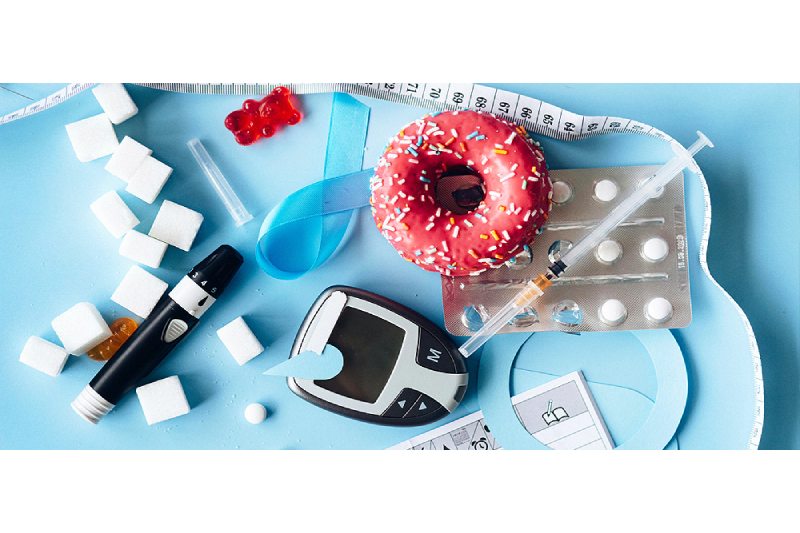This article goes beyond the foundational aspects of diabetes management and delves into practical strategies you can incorporate into your daily routine.
Building a Personalized Routine
- Identify Your Blood Sugar Patterns: Track your blood sugar levels before and after meals, exercise, and sleep. This helps you understand how your body reacts to different activities and foods.
- Plan Your Meals: Create a personalized meal plan that considers your carbohydrate intake, portion sizes, and blood sugar goals. Utilize tools like glycemic index to choose foods that cause less dramatic blood sugar spikes.
- Prepping Makes Perfect: Prepare healthy snacks and meals in advance to avoid unhealthy choices when pressed for time.
- Portion Control is Key: Invest in measuring cups and spoons to ensure you’re consuming appropriate portions.
- Mindful Eating: Slow down, savor your food, and pay attention to hunger and fullness cues to avoid overeating.
Exercise Integration:
- Find Activities You Enjoy: Choose physical activities you genuinely enjoy, like dancing, swimming, biking, or team sports. This will make exercise more sustainable in the long run.
- Start Small and Gradually Increase: Begin with manageable durations and gradually increase intensity and duration as your fitness improves.
- Incorporate Activity Throughout the Day: Take the stairs, park further away, or do short bursts of movement throughout the day to stay active.
- Consider Exercising with a Buddy: Having a workout partner can provide motivation and accountability.
- Listen to Your Body: Don’t push yourself too hard. Rest when needed and avoid exercising when your blood sugar is too high or too low.
Blood Sugar Monitoring Hacks:
- Find the Right Time to Test: Experiment with testing before meals, after meals, and before bed to understand how your blood sugar fluctuates throughout the day.
- Discreet Testing Options: Utilize discreet testing devices and supplies to make monitoring convenient and less disruptive to your daily activities.
- Data Analysis and Adjustments: Review your blood sugar readings with your doctor and make adjustments to diet, medication, or exercise routine as needed.
- Technology Integration: Explore continuous glucose monitoring (CGM) systems for real-time blood sugar data and potential automation of insulin delivery (artificial pancreas systems).
Beyond Numbers: Holistic Management
- Prioritize Sleep: Aim for 7-8 hours of quality sleep each night. Inadequate sleep can disrupt blood sugar regulation.
- Stress Management Techniques: Practice relaxation techniques like meditation, yoga, or deep breathing to manage stress, a significant factor affecting blood sugar control.
- Hydration is Key: Drink plenty of water throughout the day to stay hydrated and support healthy blood sugar levels.
- Foot Care Routine: Inspect your feet daily for cuts, blisters, or calluses. Wash your feet with warm water and mild soap, and moisturize them regularly.
- Open Communication with Healthcare Team: Maintain open communication with your doctor, diabetes educator, and other healthcare professionals to address any concerns, adjust your management plan, and stay up-to-date on the latest advancements in diabetes care.
Tech Tools for Smart Management
Living in a digital age offers several technological advancements to simplify diabetes management:
- Blood Sugar Tracking Apps: Utilize mobile apps to log your blood sugar readings, meals, medications, and exercise. These apps can generate reports and provide insights into trends.
- Carb Counting Apps: Simplify carb counting with apps that offer nutritional information for various foods and calculate the carbohydrate content of your meals.
- Reminder Apps: Set reminders for medication doses, blood sugar checks, and doctor appointments to stay on track.
- Online Support Communities: Connect with other people living with diabetes through online forums and social media groups for motivation, information sharing, and emotional support.
Travel Tips for the Diabetic Warrior
- Pack Smart: Ensure you have enough medication, testing supplies, and a glucagon emergency kit for the entire duration of your trip.
- Manage Time Zones: Plan adjustments to your medication schedule if traveling across time zones. Consult your doctor for guidance.
- Maintain a Healthy Routine: As much as possible, stick to your regular meal plan, exercise routine, and sleep schedule to minimize disruptions to your blood sugar control.
- Airport Security Considerations: Declare your diabetes supplies and medications and be prepared to show them to security personnel.
- Be Aware of Local Healthcare Resources: Research healthcare facilities and pharmacies at your destination in case of emergencies.
Meal Prep Hacks for Busy Schedules
- Batch Cooking: Cook large portions on weekends and freeze individual servings for quick and healthy meals throughout the week.
- Utilize Slow Cooker: Utilize slow cookers to prepare healthy meals that require minimal prep work.
- Healthy Snack Stash: Keep a well-stocked pantry and refrigerator with healthy snacks like nuts, fruits, yogurt, and whole-wheat crackers to avoid unhealthy choices when on the go.
- Meal Delivery Services: Consider using diabetes-friendly meal delivery services that cater to specific dietary needs.
Building Resilience: The Emotional Journey
Living with a chronic condition like diabetes can take an emotional toll. Here are some tips to build resilience:
- Challenge Negative Thoughts: Identify and challenge negative thought patterns that can lead to discouragement or frustration.
- Practice Self-Compassion: Be kind to yourself. There will be setbacks, but focus on progress, not perfection.
- Develop a Support System: Surround yourself with supportive family, friends, or a diabetes support group to provide encouragement and understanding.
- Seek Professional Help: If you’re struggling with emotional challenges, consider talking to a therapist specializing in chronic illness management.
Financial Planning and Resources
Managing diabetes can involve additional expenses for medications, supplies, and potentially, specialized foods. Here are some tips for navigating the financial aspect:
- Insurance Coverage: Understand your health insurance plan and how it covers diabetes-related costs.
- Explore Assistance Programs: Several government and non-profit organizations offer financial assistance programs for people with diabetes. Research and apply for programs that can help with medication costs, insulin pumps, and other supplies.
- Comparison Shopping: Compare prices for medications and supplies at different pharmacies and online retailers. Consider generic medications when available.
- Budgeting and Tracking Expenses: Create a budget to track your diabetes-related expenses and identify areas where you can save.
Advocacy and Awareness
- Educate Yourself and Others: Stay informed about the latest advancements in diabetes research, treatment options, and advocacy efforts.
- Become an Advocate: Raise awareness about diabetes by sharing your story and encouraging others to prioritize their health.
- Support Research Initiatives: Consider donating to organizations funding diabetes research or participating in clinical trials to contribute to finding a cure.
Conclusion
Living with diabetes requires dedication and ongoing management, but it doesn’t have to limit your life. By incorporating these daily strategies, embracing technology, planning for travel and meals, building resilience, and managing finances, you can effectively control your diabetes and live a full and healthy life. Remember, knowledge is power. With the right information and support system, you can thrive with diabetes.

 Diabetology2 weeks ago
Diabetology2 weeks ago
 Diabetology2 weeks ago
Diabetology2 weeks ago
 Diabetology1 week ago
Diabetology1 week ago
 Diabetology1 week ago
Diabetology1 week ago
 Diabetology1 week ago
Diabetology1 week ago
 Diabetology2 weeks ago
Diabetology2 weeks ago
 Diabetology1 week ago
Diabetology1 week ago
 Diabetology2 weeks ago
Diabetology2 weeks ago








